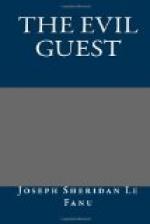The next witness examined was a little Irish boy, who described himself as “a poor scholar.” His testimony was somewhat singular. He deposed that he had come to the house on the preceding evening, and had been given some supper, and was afterwards permitted to sleep among the hay in one of the lofts. He had, however, discovered what he considered a snugger berth. This was an unused stable, in the further end of which lay a quantity of hay. Among this he had lain down, and gone to sleep. He was, however, awakened in the course of the night by the entrance of a man, whom he saw with perfect distinctness in the moonlight, and his description of his dress and appearance tallied exactly with those of Merton. This man occupied himself for sometime in washing his hands and face in a stable bucket, which happened to stand by the door; and, during the whole of this process, he continued to moan and mutter, like one in woeful perturbation. He said, distinctly, twice or thrice, “by ——, I am done for;” and every now and then he muttered, “and nothing for it, after all.” When he had done washing his hands, he took something from his coat-pocket, and looked at it, shaking his head; at this time he was standing with his back turned toward the boy, so that he could not see what this object might be. The man, however, put it into his breast, and then began to search hurriedly, as it seemed, for some hiding place for it. After looking at the pavement, and poking at the chinks of the wall, he suddenly went to the window, and forced up the stone which formed the sill. Under this he threw the object which the boy had seen him examine with so much perplexity, and then he readjusted the stone, and removed the evidences of its having been recently stirred. The boy was a little frightened, but very curious about all that he saw; and when the man left the stable in which he lay, he got up, and following to the door, peeped after him. He saw him putting on an outside-coat and hat, near the yard gate; and then, with great caution, unbolt the wicket, constantly looking back towards the house, and so let himself out. The boy was uneasy, and sat in the hay, wide-awake, until morning. He then told the servants what he had seen, and one of the men having raised the stone, which he had not strength to lift, they found the dagger, which Smith had identified as belonging to his master. This weapon was stained with blood; and some hair, which was found to correspond in color with Sir Wynston’s, was sticking in the crevice between the blade and the handle.
“It appears very strange that one man should have employed two distinct instruments of this kind,” observed Mervyn, after a pause. A silence followed.
“Yes, strange; it does seem strange,” said Marston, clearing his voice.
“Yet, it is clear,” said another of the jury, “that the same hand did employ them. It is proved that the knife was in Merton’s possession just as he left his chamber; and proved, also, that the dagger was secreted by him after he quitted the house.”




